The 2020 Mac Mini Unleashed: Putting Apple Silicon M1 To The Test
by Andrei Frumusanu on November 17, 2020 9:00 AM ESTBenchmarks: Whatever Is Available
As we’ve had very little time with the Mac mini, and the fact that this not only is a macOS system, but a new Arm64-based macOS system, our usual benchmark choices that we tend to use aren’t really available to us. We’ve made due with a assortment of available tests at the time of the launch to give us a rough idea of the performance:
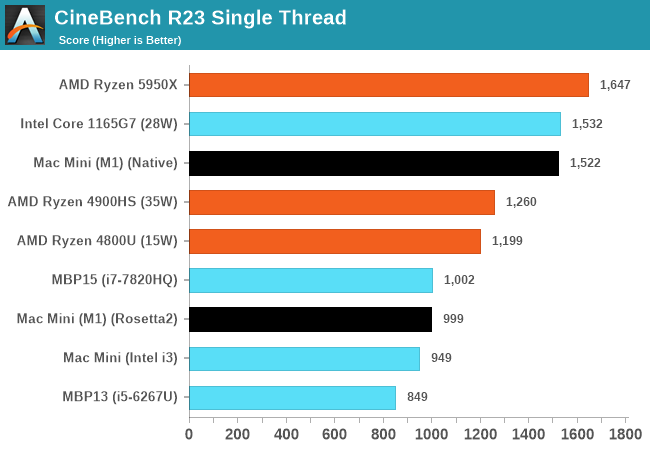
One particular benchmark that sees the first light of day on macOS as well as Apple Silicon is Cinebench. In this first-time view of the popular Cinema4D based benchmark, we see the Apple M1 toe-to-toe with the best-performing x86 CPUs on the market, vastly outperforming past Apple iterations of Intel silicon. The M1 here loses out to Zen3 and Tiger Lake CPUs, which still seem to have an advantage, although we’re not sure of the microarchitectural characteristics of the new benchmark.
What’s notable is the performance of the Rosetta2 run of the benchmark when in x86 mode, which is not only able to keep up with past Mac iterations but still also beat them.
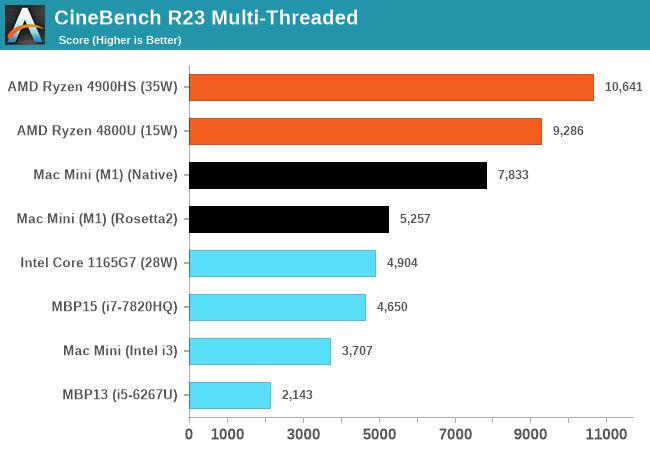
In the multi-threaded R23 runs, the M1 absolutely dominates past Macs with similar low-power CPUs. Just as of note, we’re trying to gather more data on other systems as we have access to them, and expand the graph in further updates of the article past publishing.
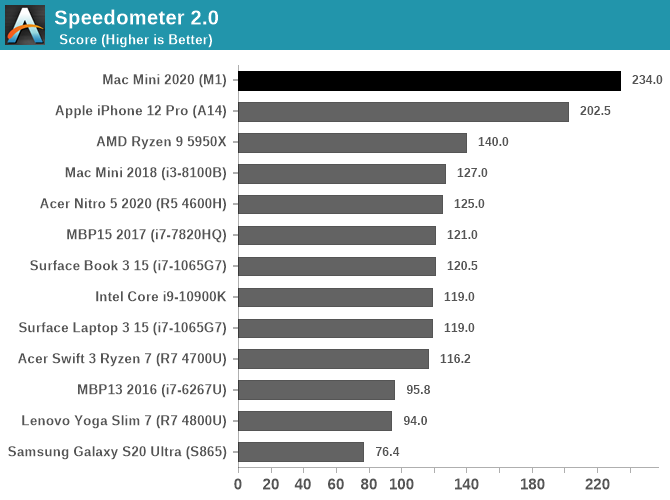
In browser-benchmarks we’ve known Apple’s CPUs to very much dominate across the landscape, but there were doubts as to whether this was due to the CPUs themselves in the iPhone or rather just the browsers and browser engines. Now running on macOS and desktop Safari, being able to compare data to other Intel Mac systems, we can come to the conclusion that the performance advantage is due to Apple’s CPU designs.
Web-browsing performance seems to be an extremely high priority for Apple’s CPU, and this makes sense as it’s the killer workload for mobile SoCs and the workload that one uses the most in everyday life.
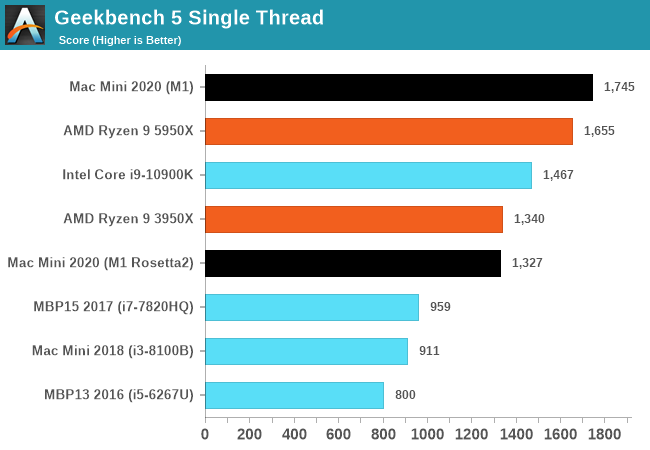
In Geekbench 5, the M1 does again extremely well as it actually takes the lead in our performance figures. Even when running in x86 compatibility mode, the M1 is able to match the top single-threaded performance of last generation’s high-end CPUs, and vastly exceed that of past iterations of the Mac mini and past Macbooks.
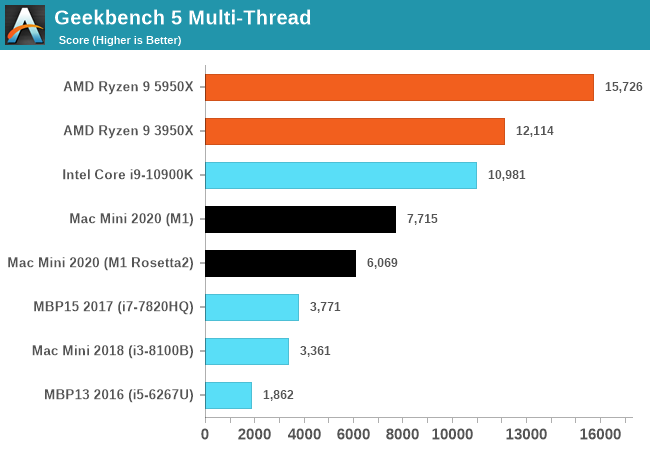
Multi-threaded performance is a matter of core-count and power efficiency of a design. The M1 here demolishes a 2017 15-inch Macbook Pro with an Intel i7-7820HQ with 4 cores and 8 threads, posting over double the score. We’ll be adding more data-points as we collect them.


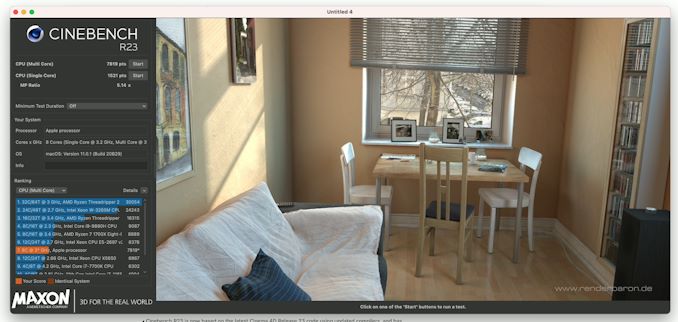








682 Comments
View All Comments
ognacy - Wednesday, November 18, 2020 - link
Performance aside, I'd point out that unlike most of what has been released this year by AMD, nVidia and Intel - its actually available to buy. I find this amazing.Also, performance too. As a developer and a software architect I always wanted a design like this one. Quiet and fast. The xcode performance is jaw dropping. My xeon-equipped notebook, heavy and noisy, is on its way out.
mjtomlin71 - Wednesday, November 18, 2020 - link
Not sure if people understand that this first M1 was specifically designed for the MacBook Air (a fan-less notebook)? And this article is comparing it against CPU's by AMD and Intel that were designed for high end desktops? It only made it into the 13" MacBook Pro and Mac mini, because even Apple was surprised how much performance they were able to get from it. You can be sure, this is NOT Apple's highest performing SoC, it is just the one they decided to release first.blackcrayon - Wednesday, November 18, 2020 - link
Yep- some of the comparisons are pretty embarrassing."Hey look at this 45 watt chip that's slightly faster than the M1 in certain tests. Sure it runs in laptops with a 50% larger battery, and 50% shorter run time. Anyway Apple should exit the market and give the money back to the shareholders!"
scottrichardson - Wednesday, November 18, 2020 - link
Thank you. Quite a lot of folk desperately trying to pluck examples from the tests that refute the M1's capabilities. Nobody is saying this chip is meant to be the most powerful overall CPU available across all markets. This is Apple's first chip, designed for their cheapest, lowest-end notebooks and mini desktop. Andrei didn't even need to include high end desktops in his review comparisons, but has done because the M1 is simply so good it deserves to be compared against these too. For a first-attempt at a new computer CPU platform, you can hold back all your specific examples of where a chip may beat the M1, because the vastly overwhelming, obvious conclusion is that this new M1 is groundbreaking, when considering it's use-case, power consumption, and performance, and the fact it's the first of likely many CPU designs from Apple. Heck, even by clocking one of these exact chips at ~4GHz would make these benchmarks a whitewash - with no other changes to anything architecturally.I'm interested in what Apple can do with a. larger memory pool and how they will handle the needs of people who use Macs like the iMac 27", iMac Pro, and the Mac Pro, who want variable amounts of RAM.
Spunjji - Thursday, November 19, 2020 - link
The only disagreement I have is with this bit of speculation:"Heck, even by clocking one of these exact chips at ~4GHz would make these benchmarks a whitewash - with no other changes to anything architecturally."
It's not clear that they *can* clock the chips that high - they would probably need to change them architecturally in order to do so.
mdriftmeyer - Saturday, November 21, 2020 - link
Correct. They would have to abandon their extreme low power model for it to hit 4Ghz. This and many other reasons is why x86 general purpose computing wins out in the end.velanapontinha - Wednesday, November 18, 2020 - link
Are you guys done with reviewing GPUs?silverblue - Wednesday, November 18, 2020 - link
I doubt it, though it helps to be sent samples, certainly when having to buy your own when none are available is now the norm.velanapontinha - Wednesday, November 18, 2020 - link
No Ampere, no RDN2, seems strange. Not the Anandtech I've followed for over 20 years.I wish they would at least say something about the absent reviews.
Silver5urfer - Thursday, November 19, 2020 - link
More Apple and less everything whatelse.